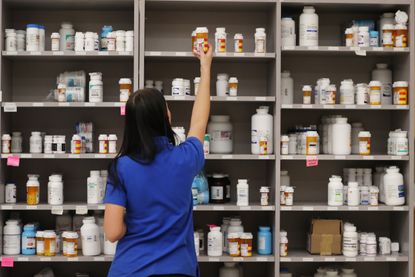Big Pharma's profitable philanthropy
A roundup of the week's best financial stories from across the web

Here are three of the week's top pieces of financial advice, gathered from around the web:
Big Pharma's profitable philanthropy
"Half of America's 20 largest charities are affiliated with pharmaceutical companies" that fund copayments on prescriptions for drugs that they manufacture, said The Economist. The drug companies set up the charities to defray the costs of copayments on expensive drugs, but this has "the fortunate consequence of making their customers price-insensitive." The charity run by AbbVie is the third largest in the country, while Bristol-Myers Squibb runs the fourth largest. In total, 13 companies spent $7.4 billion on these programs in 2016. Having copayments gives patients incentive to stick with the companies' drugs instead of opting for cheaper generics — ultimately helping the drugmakers' bottom line. The companies can then deduct up to twice the cost of their donations from pretax profits.
Subscribe to The Week
Escape your echo chamber. Get the facts behind the news, plus analysis from multiple perspectives.

Sign up for The Week's Free Newsletters
From our morning news briefing to a weekly Good News Newsletter, get the best of The Week delivered directly to your inbox.
From our morning news briefing to a weekly Good News Newsletter, get the best of The Week delivered directly to your inbox.
Doing your own tune-up
Do-it-yourself auto repair shops are popping up across the U.S., said Steve Friess at The New York Times. One typical location, My Mechanics Place in Detroit, supplies the bay, the lift, and some tools for $25 an hour. For a simple task like an oil change or tire realignment, the DIY garage could save you "60 to 80 percent on the repair costs." The concept isn't entirely new — oil companies used to lease garage stalls and lifts in the 1970s for "customers to do their own work." As cars grew more durable, the practice died out. However, some "garage entrepreneurs saw the escalating cost of auto repairs and the reputation of some dishonest mechanics as an opportunity for a renaissance." The only requirement is that you know what you're doing.
More trouble at beleaguered G.E.
General Electric's shares plummeted after a whistleblower accused the company of fraud, said Thomas Gryta and Mark Maremont at The Wall Street Journal. Harry Markopolos is best known as the "accounting expert who raised red flags about Bernie Madoff's Ponzi scheme" years before it became public. Last week, he published a 170-page research report alleging that "the struggling conglomerate has masked the depth of its problems." Markopolos says G.E.'s troubled long term–care insurance business faces $30 billion in claims over the next two decades. The report says G.E. has lied about the severity of the liability and needs to boost its insurance reserves substantially more than the $15 billion it already announced in 2018. The company denies the accusations. Once beloved by the markets, G.E. now trades at a 10-year low.
Sign up for Today's Best Articles in your inbox
A free daily email with the biggest news stories of the day – and the best features from TheWeek.com
Create an account with the same email registered to your subscription to unlock access.
-
 Nigeria's worsening rate of maternal mortality
Nigeria's worsening rate of maternal mortalityUnder the radar Economic crisis is making hospitals unaffordable, with women increasingly not receiving the care they need
By Harriet Marsden, The Week UK Published
-
 'Elevating Earth Day into a national holiday is not radical — it's practical'
'Elevating Earth Day into a national holiday is not radical — it's practical'Instant Opinion Opinion, comment and editorials of the day
By Harold Maass, The Week US Published
-
 UAW scores historic win in South at VW plant
UAW scores historic win in South at VW plantSpeed Read Volkswagen workers in Tennessee have voted to join the United Auto Workers union
By Peter Weber, The Week US Published
-
 Arizona court reinstates 1864 abortion ban
Arizona court reinstates 1864 abortion banSpeed Read The law makes all abortions illegal in the state except to save the mother's life
By Rafi Schwartz, The Week US Published
-
 Trump, billions richer, is selling Bibles
Trump, billions richer, is selling BiblesSpeed Read The former president is hawking a $60 "God Bless the USA Bible"
By Peter Weber, The Week US Published
-
 The debate about Biden's age and mental fitness
The debate about Biden's age and mental fitnessIn Depth Some critics argue Biden is too old to run again. Does the argument have merit?
By Grayson Quay Published
-
 How would a second Trump presidency affect Britain?
How would a second Trump presidency affect Britain?Today's Big Question Re-election of Republican frontrunner could threaten UK security, warns former head of secret service
By Harriet Marsden, The Week UK Published
-
 'Rwanda plan is less a deterrent and more a bluff'
'Rwanda plan is less a deterrent and more a bluff'Instant Opinion Opinion, comment and editorials of the day
By The Week UK Published
-
 Henry Kissinger dies aged 100: a complicated legacy?
Henry Kissinger dies aged 100: a complicated legacy?Talking Point Top US diplomat and Nobel Peace Prize winner remembered as both foreign policy genius and war criminal
By Harriet Marsden, The Week UK Last updated
-
 Trump’s rhetoric: a shift to 'straight-up Nazi talk'
Trump’s rhetoric: a shift to 'straight-up Nazi talk'Why everyone's talking about Would-be president's sinister language is backed by an incendiary policy agenda, say commentators
By The Week UK Published
-
 More covfefe: is the world ready for a second Donald Trump presidency?
More covfefe: is the world ready for a second Donald Trump presidency?Today's Big Question Republican's re-election would be a 'nightmare' scenario for Europe, Ukraine and the West
By Sorcha Bradley, The Week UK Published